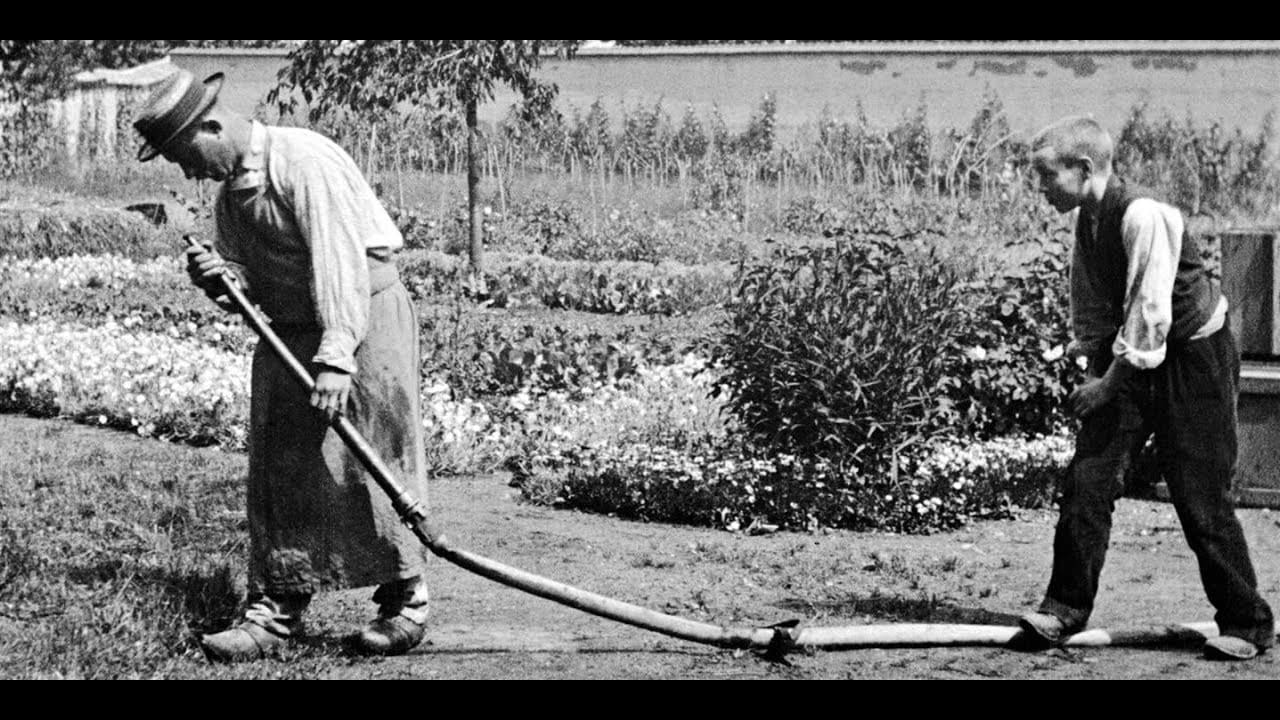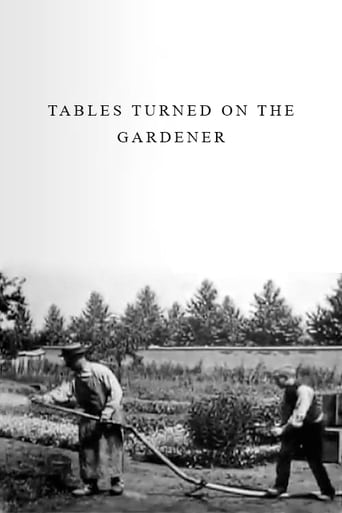

On the 28th of December 1895, history was written. In the basement of a café in Paris, about 30 people witness the worlds first film screening by the Lumière brothers with their Cinématographe. This short is one of ten shorts shown on that day.It has a 45 second running time so the plot is simple: A gardener is using his garden-hose, when a boy starts standing on the hose. While checking what happened, the boy stands of the hose, allowing the water to spry the gardener wheat. The slapstick comedy in this film is funnier that in your average Adam Sandler film, and this film is 119 years old.It is the birth of cinema and comedy in one. The starting point of the reason why this site exist.
... View MoreIn this little slapstick comedy we see a gardener doing his day job, suspecting nothing evil until the hose suddenly stops giving water. What's going on. Surprised about the error the gardener takes a closer look at the hose hoping to find the malfunction. Bad mistake, bad bad mistake. For the reason behind it all is a little feisty boy who intentionally stepped on the hose. And what does he do the moment the gardener directs the hose right at his face to find the error. You know the answer.Completely soaked, the man finally spots the delinquent and it's time for a spanking. You get what you give.
... View MoreOn December 28, 1895, thirty-three people were witnesses of history being written as the very first audience of the Lumières' Cinématographe, an innovative device that was able to project motion pictures on a screen. Motion pictures were not new for the people gathered on at Paris's Salon Indien Du Grand Café that day, as Edison's Kinetoscope (the "Peep Show") was a popular form of entertainment; however, nobody in the room was prepared to see the images projected on the screen to move as unlike the Kinetoscope, the Cinématographe allowed the movies to be seen by an audience. 10 short films shot by August and Louis Lumière were shown that historic day, most of them depicting everyday scenes like people walking out of the Lumière factory or playing cards, but one among those 10 short films was different: "L' Arroseur Arrosé", the first comedy film."L' Arroseur Arrosé", literally ("The Sprinkler Sprinkled"), is basically about a practical joke committed by a mischievous boy (Benoît Duval) to annoy a Gardener (François Clerc) who is working with his plants in Lyons. The movie begins with the Gardener watering his vegetables when the boy steps on the hose he is using to water the plants. The Gardener is surprised as the water stops flowing so he inspects the nozzle to find out what's happening. As he checks it, the boy releases the hose and the water continues flowing, spraying the gardener as it comes out of the hose with strength. Surprised by this, the Gardener quickly realizes that he's been tricked, but the boy responsible escapes running away in order to avoid being caught. The Gardener decides to chase the boy in order to punish him for his actions.When compared to the other 9 movies shown on that first screening, "L' Arroseur Arrosé" always stand out as it was remarkably different from any of the other movies in the sense that it wasn't an "actuality film", but the very first staged fictional comedy shot on film. The Lumière brothers had a preference for documentaries (actuality films) as they weren't really interested in other uses for their invention besides the scientific documentation of real life events; so it is because of this reason that the creation of "L' Arroseur Arrosé" is truly a real oddity among Lumières' movies. Anyways, not only is this movie special for those reasons, it is also one of the best looking of the 10 (and one that has survived almost intact to this date), with the brothers showing a great early use of cinematography to frame the film.In its barely 50 seconds of duration, "L' Arroseur Arrosé", opened the way to slapstick and pantomime in film, as the movie showed that it was possible to use the new invention to make pure entertainment, and that there was an extremely high unused potential in the Cinématographe. It wouldn't be too far of a stretch to claim that comedy films were born in this movie. While the reasons behind the inclusion of this film among 9 documentaries is odd, it was quite probably that this was the film that inspired a notable member of that first audience to make fictional movies aimed to entertain: Georges Méliès, who would later become a famous filmmaker on his own (and would direct a remake of this very film too). 9/10
... View MoreThe first fully staged fiction and comedy film is of a piece with the Lumieres previous work, full of energy contained. In 'Sortie d'Usine', a calm street scene was broken by exiting workers; in 'Repas de Bebe', a model family unit was decentred by a dribbling boy; in 'Demolition d'un mur', the hierarchical order of boss and workers is disrupted by a crashing wall. In this case a rural idyll, a man, a worker at one with nature, with his work, is interrupted by an idle interloper; work and purpose vs. play and sensation; documentary vs fiction, fantasy, escapism? David Thomson claims that the film works because the audience is made complicit with the boy's antics. This is true, and the boy is subversive - he derails the work, the harmony between man and nature, man and work. He inflicts physical harm without being proximate to his victim, like a gangster shooting from a distance. He forces the man to abandon his fixed spot to apprehend him.But he IS punished,and he is slapped for his deed, brought, as critics have noted, nearer the screen so the audience can see, as if the man is punishing us for enjoying the prank. Disruption will not be tolerated - the boy is cast out of the frame; harmony is restored.All the while, as in 'Repas', nature looks on, indifferent immemorial, ignorant of the reactionary and the revolutionary alike. The Lumieres are very prescient in this film, understanding that they will be unable to hold onto the dutiful, purposeful hose for much longer; that the irresponsible pranksters are waiting to take over, to spray refreshing water over their audience's faces, an audience rather averse to the Lumieres' patronising ideals of moral elevation and 'science'.
... View More